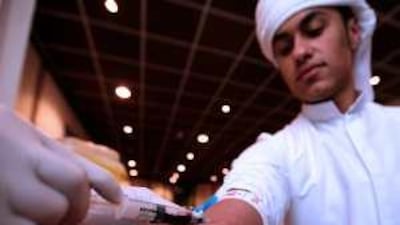DUBAI // Arabs suffer from one of the highest rates of genetic disease in the world, according to a research institute. Some 906 genetic disorders have been identified in Arabs and their descendants, reports the Centre for Arab Genomic Studies (CAGS), and about 200 of those are prevalent among Arabs in the GCC alone. It warns that the problem will require research and collaboration among medical communities.
In the UAE, 241 disorders have been identified in Arab citizens and expatriates combined, making the incidence in this country the second-highest in the Arab world after Oman; 119 genetic disorders are specific to Emiratis. These figures are thought likely to rise, too, as researchers discover new disorders in the Arab world and record them in a database being developed by the CAGS. The centre, funded by the Sheikh Hamdan Award for Medical Sciences, has completed studies of Bahrain, Oman and the UAE.
It plans to compile extensive data on genetic disorders in every Arab country to help pave the way for treatment and prevention-based health policies in the region. Patients are defined as Arab if they are of Arab ancestry, whether on the maternal or paternal side and regardless of where they happen to live. Countries such as Brazil, Canada and France, for example, have large Arab communities. "Why build this database? It gives us a bird's-eye view of each country on genetic diseases. Some are epidemic and some very rare," said Dr Ghazi Tadmouri, the assistant director of the CAGS.
Several common diseases in the UAE, Oman and Bahrain have reached epidemic levels - more than 100 cases per 100,000. They include thalassaemia (a blood disorder), diabetes, breast cancer and Down's syndrome. Less common genetic disorders in the Emirates include muscular dystrophy and kidney disease. About 63 per cent of the genetic conditions in Arab populations are due mostly to marriage between close relatives such as first cousins, clinically known as consanguinity.
Such marriages, deeply ingrained in Arab culture, are on the rise in the UAE, where the rate is the fifth-highest in the Arab world. In Dubai, 40 per cent of marriages are between relatives, according to the latest statistics. In Al Ain that figure reaches 54 per cent, and in Abu Dhabi 32 per cent. Across the Arab world, Sudan and Mauritania have the highest rates, amounting to two-thirds of all marriages. However, consanguinity is on the decline in, for example, Egypt and Tunisia.
The good news is that more than half the genetic disorders in Arab populations are the result of a defect in only one gene, which means it would be relatively easy to screen for such a gene and to prevent or treat the disorder. However, Dr Tadmouri said there were no national projects aimed at controlling genetic disorders in most Arab countries. Pre-natal detection of disease should be more available, he said, while early diagnosis was essential in treating many disorders. Other preventive measures included screening potential spouses for defective recessive genes.
"It is becoming mandatory to do basic screening for thalassaemia and other diseases before marriage," Dr Tadmouri said. He called on medical professionals in Arab countries to keep track of genetic disorders. When he first started compiling data for the centre's database in 2004, he found there were many genetic disorders in the UAE that were not documented. "There's little or no incentive for doctors here to keep track of such data from their patients," he said.
"We're hoping that the western educational establishments that are opening here will go beyond teaching a few disciplines here and there. "We're hoping they will establish real academic institutions and build a vibrant academic atmosphere in the medical sciences. "That's what the Arab world needs to overcome genetic disorders." relass@thenational.ae

